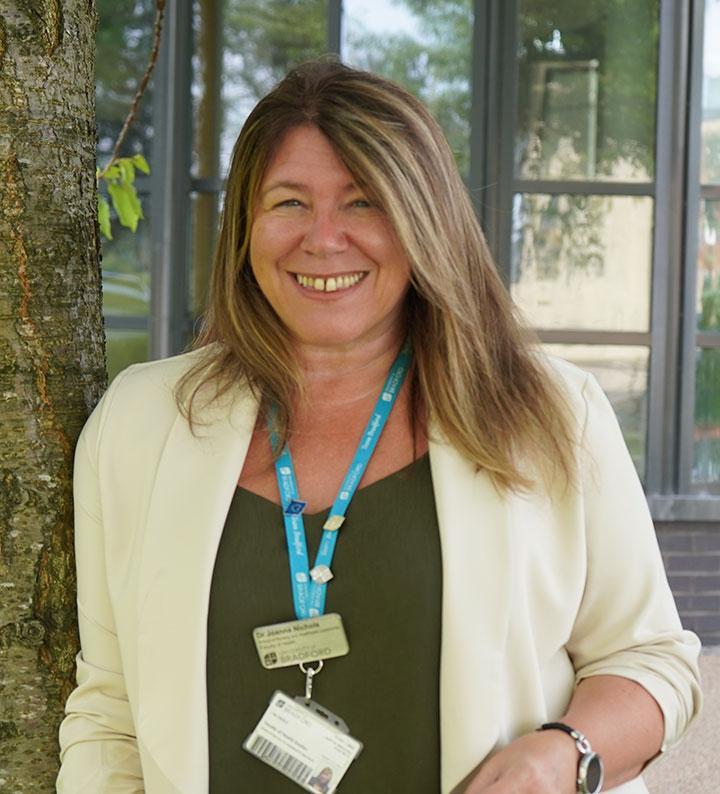Academic Profile – Dr Joanna Nichols
Examining policies and practices around teenage pregnancy
Dr Joanna Nichols is Associate Professor in the School of Nursing and Healthcare Leadership with responsibility for Healthcare Leadership, Postgraduate taught studies, and Continuing Professional Development courses run by the school. Her research interests include governance of young people's sexual health and teenage pregnancy, and has contributed to a new book on this subject. She also has the distinction of completing an undergraduate degree, a master’s degree and a PhD here at the University of Bradford.
How did your association with the University begin?
When my son was small, I was looking at evening classes at Bradford as it was my local university, and chose a course in trade union studies as it was a subject of interest to me. This was a good experience, and as my son got a bit older I had time for more modules which eventually led to a Combined Studies degree focusing on industrial relations and housing.
After this, I had a variety of jobs - I worked in regeneration projects, in a women's refuge and in local authority community health development roles, and I was working as a teenage pregnancy coordinator in Calderdale when I decided to do a master's degree. This role had more leadership and commissioning aspects, so to develop my skills I chose a master’s in Leadership Management and Change at Bradford.
I was studying while working in a local Primary Care Trust Public Health Team focusing on young people's sexual health and teenage pregnancy, and at this time I was seconded to do this regionally across Yorkshire and Humber. I was then seconded to work at the Department of Health doing the same thing nationally, looking at implementation, strategic development and governance across England for teenage pregnancy.
The work we were doing was very innovative, particularly around school-based health services, and I really care about the subject, so when it came to speaking to a variety of local and national government leaders about making this a priority, I was pretty convincing.

Dr Joanna Nichols
What made you decide to return to the University of Bradford as an academic?
In 2010, the incoming government decided to change strategy and disbanded the national support teams and strategic health authorities that I’d been a part of. I also had a change in my personal life, so it seemed like the right time for something different.
I thought the academic world seemed like a great opportunity to explore my passions, share knowledge and research all the stuff I’m interested in, and get paid to do it! I started as a lecturer and began a PhD alongside my teaching, which was an evaluation of the sustainability of the teenage pregnancy national policy, looking at factors which supported this over time.
How did the COVID-19 pandemic affect your work?
I was just finishing my PhD in 2020 at the outbreak of the pandemic and the lockdown, which meant the final stages of my research, and my viva (the verbal presentation to examiners) were conducted online, which wasn’t ideal, but something we all had to deal with.
At the same time, there was an opportunity to help in the response to the pandemic, and with my public health background I felt I couldn't stand on the side lines as this disaster unfolded. I was able to go back to the local authority that I originally worked in when I did the teenage pregnancy work, and for one day each week alongside my academic role I co-ordinated their care homes infection control response.
My job was to project manage implementation of infection prevention and control measures with the team of senior people across Trusts, local authority, and care homes with strategic responsibility to implement the government’s safety measures. The virus was running way out of control and it was hugely challenging to try to catch up to it. I did that from April until September 2020 and it was a really difficult period of time, as I was also writing up my PhD thesis and still working full time at the University.
While it was a challenging experience, it reaffirmed to me that systems leadership is an important and necessary area of public health. It also reminded me of the benefits of being connected to my public health profession and to be involved in that practice.
Can you describe your current research?
I’ve been collaborating with Alison Hadley OBE, who I’ve worked with for a long time. Alison was the senior civil servant in charge of the National Teenage Pregnancy unit who invited me to work with her on strategic development. I’ve contributed to her book ‘Teenage Pregnancy and Young Parenthood: Effective Policy and Practice’, published in November 2024. This is the second edition of her original evaluation of the strategy. It includes elements of my PhD research - looking at the changes from 2010 when the National Teenage Pregnancy Unit was disbanded and there was no longer funding or national support. I was interested in how some areas were doing much better than others, and the reasons for that.
For the second edition of the book, we wanted to update the original research which covered 2015 to 2018 and look at 2019-2022. I went back out to re-interview some of the people from my PhD research and talk about the effects from this period of huge change. The issues raised included COVID-19 and young people's experience of lockdowns, how moving to online services opened up access for some but excluded others, and the ongoing effect of austerity policy and its implications, which all give context for the research in the book.
I’m also trying to make time for that work back in public health and my area of interests, and I'm involved in an NIHR bid around young people's pregnancy choices. I’m also hoping to work with colleagues across the University in a research group on reproductive health.
